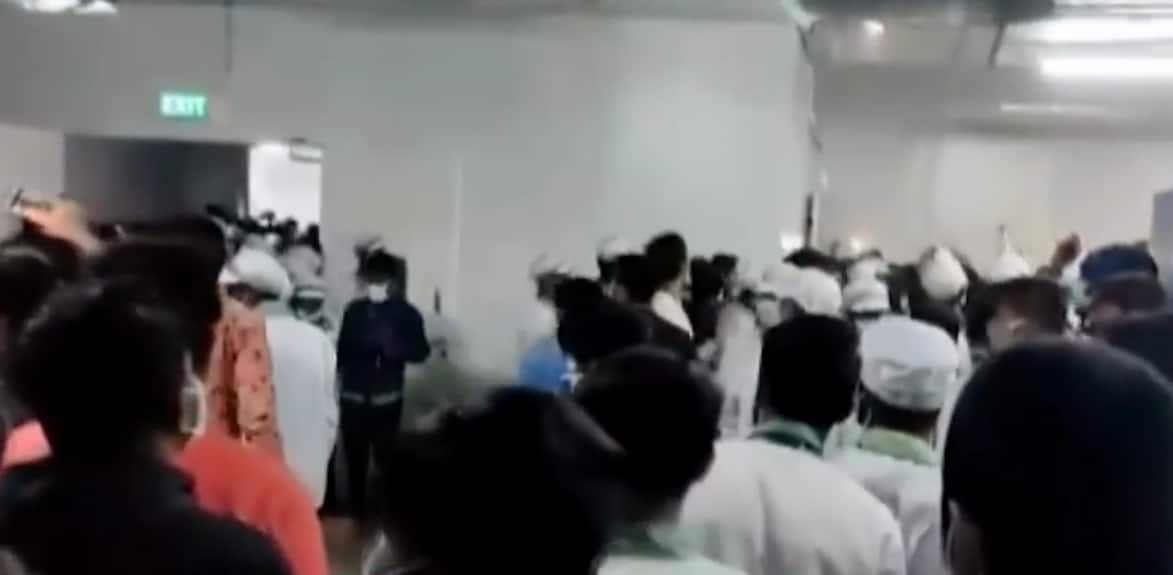



It was the start of another busy day at the iPhone manufacturing plant of Taiwan tech giant Wistron Corporation in Karnataka’s Naraspura on December 12. The night shift workers were about to leave when violence broke out.
In the mayhem, allegedly unleashed by a section of workers unhappy over salary delays, furniture was broken, CCTVs smashed, cars damaged, equipment was set on fire and phones stolen.
Wistron Corporation says it suffered losses to the tune of Rs 440 crore in the violence, which comes at a time when India is pitching itself as a manufacturing hub with countries looking for an alternative to China.
“People barged in from all entry gates. We didn’t even understand who these people were. They started shouting slogans seeking salary payments. But this didn’t look spontaneous, and we had been hearing murmurs of discontent for the past three-four months,” said a contract worker who did not want to be identified.
The complaints of delayed salaries coincide with India consolidating its labour laws into a labour code. The code allows state governments to suspend labour laws under certain conditions. Karnataka, too, has overhauled its labour laws.
Speaking to workers and members of labour unions, Moneycontrol found that fault lines run deep, especially at manufacturing units that employ contractual workers.
 Vandalised property at Wistron's iPhone manufacturing facility in Narasapura, Karnataka
Vandalised property at Wistron's iPhone manufacturing facility in Narasapura, KarnatakaThe so-called third-party agencies work as intermediaries. They hire employees on a contract, freeing up the companies of any contractual obligations, making it easy to hire and fire. The staff works for the company but are on the rolls of these agencies.
There are also claims that “outsiders” joined in the arson but it is hard to verify them as the attackers were wearing masks.
At Wistron facility, set up two years ago in Kolar district and 70 kilometres away from the state capital Bengaluru, this was the first such recorded incident of violence.
The CCTV footage shows close to 1,500 people stormed the unit. The police have arrested 156 people for inciting violence and vandalising property. The labour commissioner also met the third-party agencies on December 14 to look into complaints of salary delays.
The question, however, is what led to the violence and was there a violation of labour laws?
The incident and repercussionsJob security, payment delays and growing discontent against Wistron management over its refusal to resolve their complaints is believed to have angered the employees.
“Some payment delays have happened and this causes a lot of financial stress for us. There were also talks of workers planning to protest, but we didn’t realise this would get violent,” said another contractual worker.
He added that some workers who joined early this year were promised salaries of up to Rs 22,000 but were paid only Rs 14,000-15,000. The COVID-19 pandemic was used as an excuse to cut salaries but the work had remained the same, he said. Moneycontrol could not independently verify these claims.

Workers assemble amidst violence at Wistron plant in Karnataka
Wistron did not respond to Moneycontrol’s email seeking its comments. Reports have said Apple is investigating the incident and allegations of labour law violations. An email sent to Apple’s India team, too, went unanswered.
In a filing to the Taiwan Stock Exchange, Wistron Corporation said, “We are deeply shocked by the events at our Narasapura facility. We follow the law and are supporting the authorities with their investigation. The safety and wellbeing of our team members is always our top priority. We will collaborate with related parties to provide any help needed for the employees.”
The facility was shut and even nearby units downed shutters the next day fearing violence. These facilities resumed activities from the next day amid heavy police presence
What are the workers' issues?Workers said the biggest issue was being on the rolls of the third-party agencies, who hired and fired at will and also delayed payments.
Insiders said while Wistron employed 14,000 people, only 10 percent of them were regular staff. The rest are contractual workers whose salaries are handled by third-party agencies.
One of the workers quoted above said while Wistron may not have been directly responsible for salary delays, they could have intervened and ensured payments were made on time.
Karnataka state labour commissioner Akram Pasha told Moneycontrol that the delay by the contractors was a one-off incident. Since it was a new facility, there was no formal union or organised structure for these workers, he said.
“In our meeting, we found out that the salary that was to be paid on the 7th of the month was instead paid on the 11th. Also, there was a software glitch because of which one to two days salary could not be remitted. If the workers had any concerns about their monthly pay, they could have contacted the labour department. However, no such complaints have been filed so far,” he added.
Pasha said Wistron would resume production once repairs were done.
Labour rights ignored?It is not just the Wistron facility that is facing worker discontent. At the Toyota Kirloskar Motors plant in Bidadi, Karnataka, the worker strike entered the 36th day. The workers say they are being overworked.
Similarly, at garment manufacturer Gokuldas Exports there were protests in June 2020 after 1,300 workers were laid off. The company had cited the COVID-19 slowdown as the reason.
The violence in Wistron was a result of mismanagement and exploitation of workers of the world’s most expensive mobile phone brand, All India Trade Union Congress, Bengaluru, general secretary MD Harigovind said.
“Local workers are being made to work in unskilled categories and outsiders have been employed for other operator roles. The management was asked for a resolution but no effort was made. This was spontaneous and workers were forced to agitate,” he added.
The police are looking at the shift-schedules to ascertain the names of workers present at the facility during the time of violence. Initial investigations have pointed to the involvement of outsiders.
Treatment of contractual labour and a lack of dialogue between the management and the workers is also to blame, say labour rights experts.
KR Shyam Sundar, labour economist and a professor at XLRI-Xavier School of Management, Jamshedpur, told Moneycontrol that the industrial relations policies adopted by companies were typically adversarial and followed a cost-cutting approach.
However, companies manufacturing iPhones that have a predictable demand shouldn’t have such issues, he said.
“Workers have become increasingly insecure because there are contractors and sub-contractors adopting precarious fluctuating job practices. Why should there be wage arrears by an MNC? It reflects that there is a lack of social dialogue between workers and management,” he added.
Labour law changes a factor too?The Karnataka government had in July 2020 decided to tweak rules to boost ease of doing business in the state. One of the new rules says there wouldn’t be surprise inspections at manufacturing plants. These inspections were meant to check labour law violations, including work hours, working conditions and minimum wages. A report said the government will give notices to companies before such inspections.
Ease of doing business couldn’t be at the cost of workers’ rights, Professor Shyam Sundar said.
“Karnataka has liberalised labour inspections. If the inspection system was robust and intervention by the state was adequate along with proper dialogue between the workers and the management, this situation wouldn’t have escalated,” he added.
Discover the latest Business News, Sensex, and Nifty updates. Obtain Personal Finance insights, tax queries, and expert opinions on Moneycontrol or download the Moneycontrol App to stay updated!
Find the best of Al News in one place, specially curated for you every weekend.
Stay on top of the latest tech trends and biggest startup news.